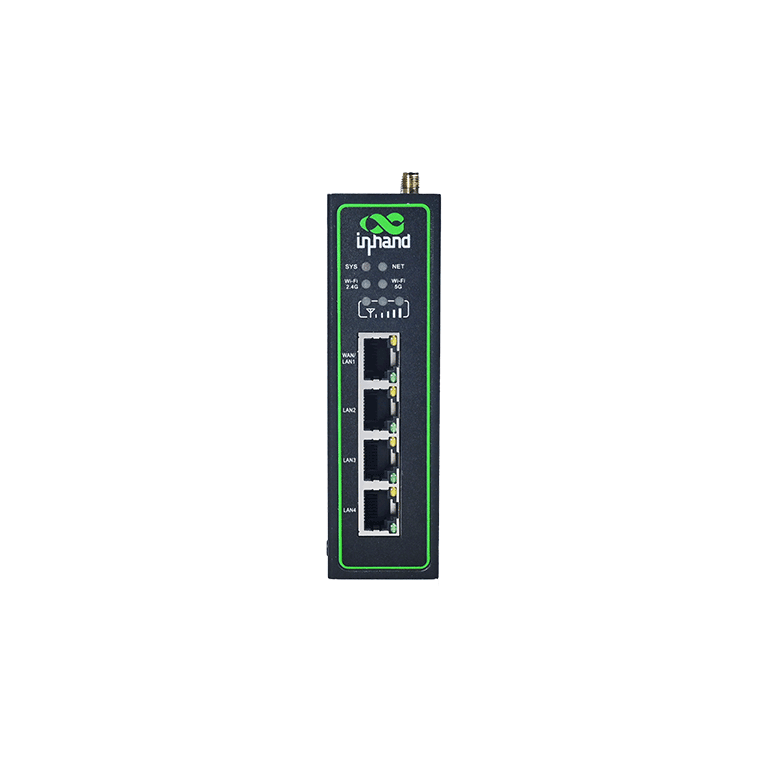
In der vernetzten Welt von heute sind Router für den reibungslosen Betrieb von Netzwerken unerlässlich. Ob für eine Heimeinrichtung oder eine industrielle Anwendung, die Auswahl des richtigen Routers ist entscheidend. Dieser Artikel bietet einen umfassenden Vergleich von Industrieroutern und Heimroutern, wobei die Unterschiede aus verschiedenen Blickwinkeln untersucht werden, damit Sie eine fundierte Entscheidung treffen können.
Sicherheit
- Industrielle Router: Industrierouter sind mit erweiterten Sicherheitsmaßnahmen ausgestattet, um komplexen Netzwerkbedrohungen zu begegnen. Sie bieten Funktionen wie Zugangskontrolle, Schutz vor DDoS-Angriffen (Distributed Denial of Service) und virtuelle IP-Zuordnung zum Schutz der Datenübertragung. Darüber hinaus unterstützen Industrierouter VPN-Funktionen (Virtual Private Network), die einen sicheren Fernzugriff auf das Netzwerk gewährleisten.
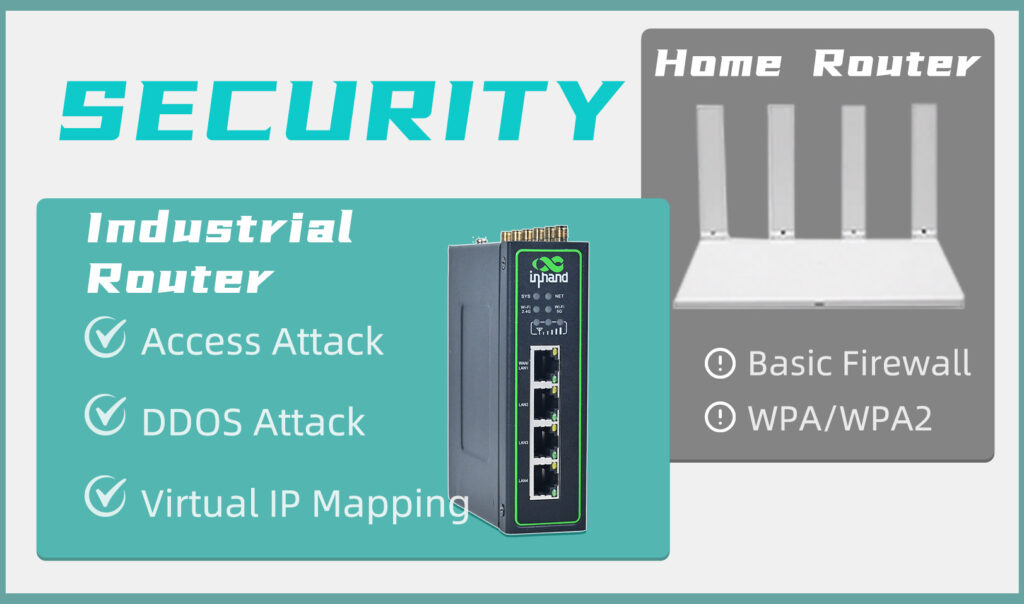
- Heim-Router: Heimrouter bieten im Vergleich zu Industrieroutern in der Regel geringere Sicherheitsfunktionen. Sie verlassen sich auf grundlegende Funktionen wie Firewalls und WPA/WPA2-Wireless-Verschlüsselung, um das Netzwerk zu sichern. Einige fortschrittliche Heimroutermodelle bieten zwar VPN-Unterstützung, doch sind ihre Funktionen und Konfigurationsoptionen im Allgemeinen weniger robust und umfassend als die von Industrieroutern.
Verlässlichkeit

- Industrielle Router: Industrielle Router sind auf außergewöhnliche Zuverlässigkeit und dauerhaften Betrieb ausgelegt. Sie verfügen über Funktionen wie redundante Stromversorgungen, automatische Failover-Mechanismen und eine hohe Temperaturtoleranz, so dass sie auch in extremen Umgebungen zuverlässig funktionieren. Dieses Maß an Langlebigkeit gewährleistet eine stabile Netzwerkleistung in anspruchsvollen Umgebungen wie Fabriken, Bergwerken und Außenbereichen.
- Heim-Router: Heimrouter sind in erster Linie für die relativ stabilen Bedingungen zu Hause konzipiert. Sie bieten zwar im Allgemeinen zuverlässige Netzwerkverbindungen, ihre Leistung kann jedoch unter extremen Bedingungen wie hohen Temperaturen oder hoher Luftfeuchtigkeit nachlassen. Außerdem verfügen Heimrouter in der Regel nicht über redundante Funktionen, was bedeutet, dass bei einer Störung oft ein manueller Eingriff erforderlich ist, um die Funktionalität wiederherzustellen.
Einfaches Management
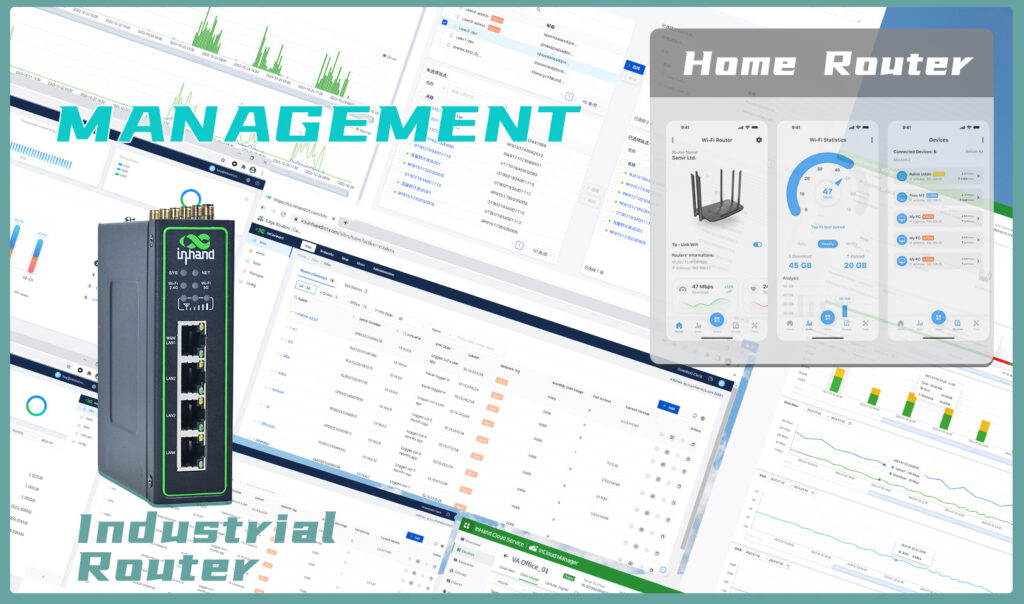
Industrielle Router: Industrielle Router sind mit umfangreichen Verwaltungsfunktionen ausgestattet, einschließlich Fernverwaltung, zentraler Steuerung und Konfigurationssicherung. Mit professioneller Netzwerkverwaltungssoftware können Administratoren den Netzwerkstatus in Echtzeit überwachen, Verkehrsmuster analysieren und erweiterte Sicherheitsrichtlinien konfigurieren. Dank dieser Funktionen eignen sich Industrierouter ideal für die Verwaltung großer Netzwerke und die Handhabung komplexer Anwendungen.
Heim-Router: Router für den Heimgebrauch sind auf Einfachheit ausgelegt und richten sich an alltägliche Benutzer. Sie verfügen in der Regel über einfache Einrichtungsassistenten und benutzerfreundliche Verwaltungsschnittstellen, die die Durchführung einfacher Netzwerkkonfigurationen erleichtern. Einige fortschrittliche Heimrouter bieten zwar eine mobile App-Verwaltung für zusätzlichen Komfort, ihre Funktionalität ist jedoch im Vergleich zu den robusten Verwaltungsfunktionen von Industrieroutern begrenzt.
Skalierbarkeit
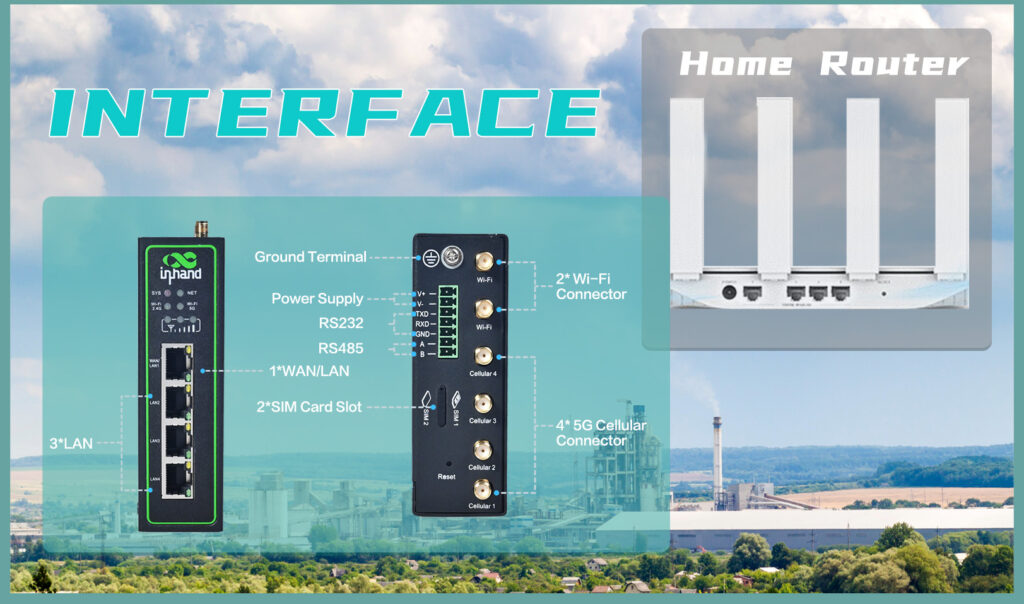
Industrielle Router: Industrielle Router sind hochgradig skalierbar und für die unterschiedlichsten Netzwerkanforderungen ausgelegt. Sie unterstützen mehrere Schnittstellen und Module, z. B. serielle Ports, Glasfaserschnittstellen und Ethernet-Ports, und ermöglichen so nahtlose Verbindungen mit einer Vielzahl von Geräten und Systemen. Darüber hinaus sind Industrierouter mit zahlreichen Kommunikationsprotokollen kompatibel, was eine reibungslose Integration mit verschiedenen industriellen Geräten und Anwendungen gewährleistet.
Heim-Router: Heimrouter haben eine relativ begrenzte Skalierbarkeit. Sie bieten in der Regel Ethernet-Anschlüsse und WLAN-Konnektivität, die für die Verbindung von Haushaltsgeräten wie Computern, Smartphones und Smart-Home-Systemen ausreichen. Einige fortschrittliche Modelle unterstützen zwar USB-Erweiterungen und Mesh-Netzwerke, aber ihre allgemeine Skalierbarkeit und Anpassungsfähigkeit ist im Vergleich zu Industrieroutern geringer.
Verwendungsszenarien
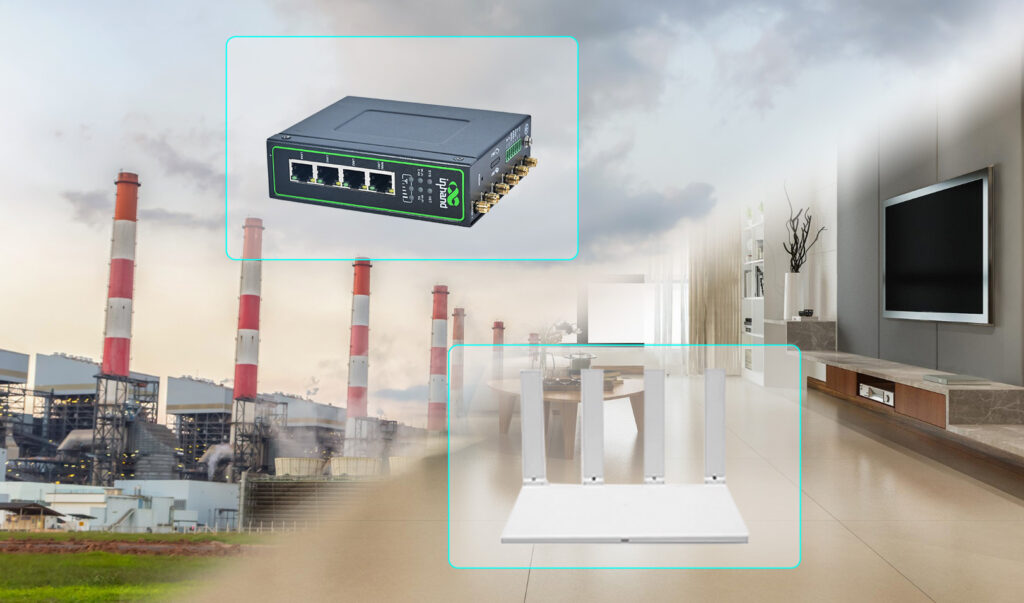
Industrielle Router: Industrielle Router sind für Anwendungen in Bereichen wie der industriellen Automatisierung, dem intelligenten Transportwesen und dem Energiemanagement konzipiert. Diese Szenarien erfordern einen stabilen, effizienten und sicheren Netzwerkbetrieb, um die ununterbrochene Leistung von Produktionssystemen und kritischen Geschäftsprozessen zu gewährleisten.
Heim-Router: Home-Router sind in erster Linie für den Hausgebrauch konzipiert und erfüllen alltägliche Anforderungen wie das Surfen im Internet, Streaming und die Unterstützung von Smart Home-Geräten. Sie legen Wert auf eine benutzerfreundliche Bedienung und Kosteneffizienz und bieten eine zuverlässige WLAN-Abdeckung und einen Internetzugang für typische Heimumgebungen.
Sind industrielle Router für den Heimgebrauch geeignet?
Industrierouter bieten zwar hervorragende Leistung und Sicherheitsfunktionen, sind aber für den Heimgebrauch möglicherweise nicht die beste Wahl.
Erstens sind Industrierouter in der Regel teurer, was sie für durchschnittliche Haushalte weniger kosteneffizient macht. Zweitens kann ihre Einrichtung und Verwaltung komplex sein, was zusätzlichen Zeitaufwand und technisches Fachwissen erfordert, was für normale Benutzer eine Herausforderung sein kann. Außerdem sind ihr robustes Design und ihre fortschrittlichen Schutzfunktionen, die auf raue Industrieumgebungen zugeschnitten sind, in den meisten Haushalten unnötig.
Wenn Sie jedoch besondere Anforderungen an Ihr Netzwerk haben, z. B. erhöhte Sicherheit, zuverlässigen Fernzugriff oder Unterstützung für spezielle Geräte, könnte ein Industrierouter eine sinnvolle Option sein. Für die meisten Haushalte sind Heimrouter jedoch mehr als ausreichend, um die täglichen Netzwerkanforderungen effektiv zu erfüllen.
ZusammenfassendDie Entscheidung zwischen einem Industrierouter und einem Heimrouter hängt von Ihren spezifischen Anforderungen ab. Industrierouter zeichnen sich durch hohe Sicherheit, Zuverlässigkeit, fortschrittliche Verwaltungsfunktionen und Skalierbarkeit aus und sind daher ideal für anspruchsvolle und komplexe Umgebungen. Im Gegensatz dazu sind Heimrouter auf Benutzerfreundlichkeit und Kosteneffizienz ausgelegt und eignen sich perfekt für alltägliche Anwendungen im Haushalt. Wenn Sie diese Unterscheidungen kennen, können Sie eine fundierte Entscheidung treffen und den besten Router für Ihre Situation auswählen.
